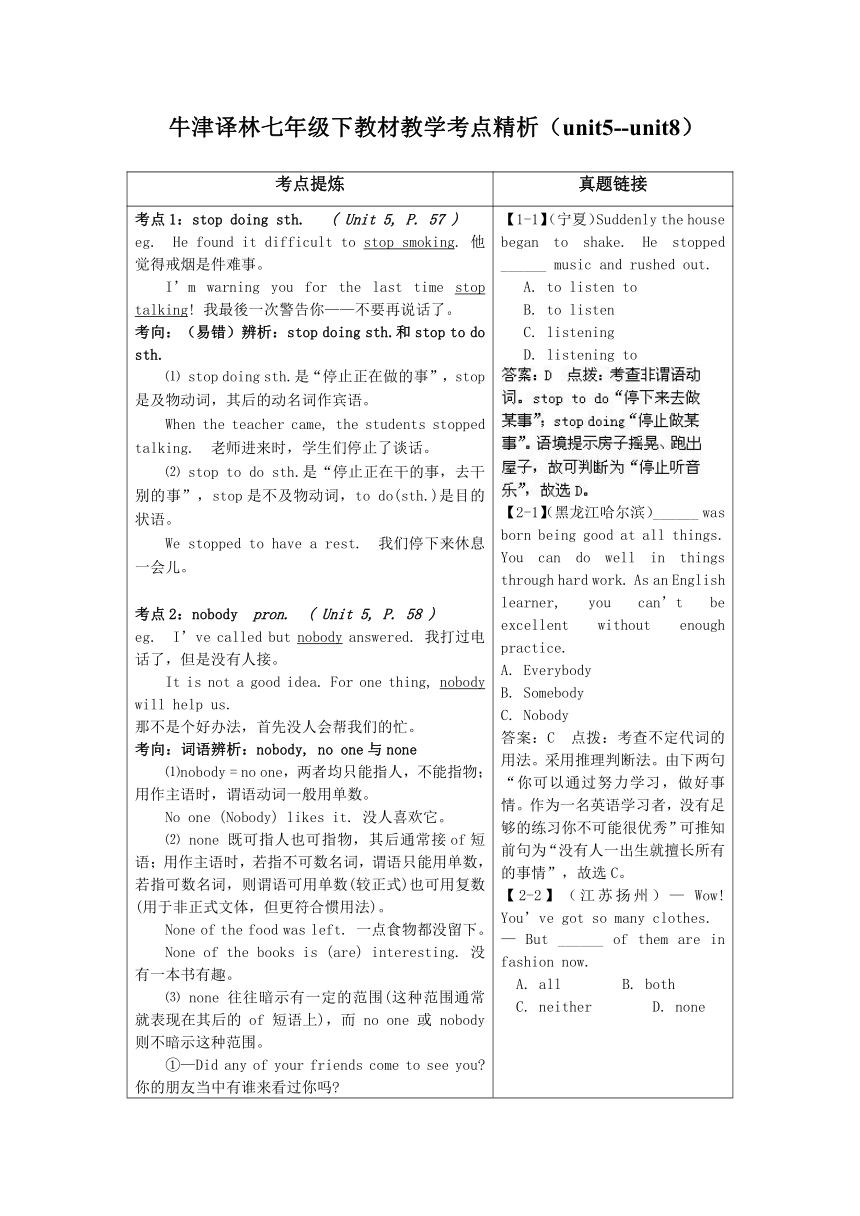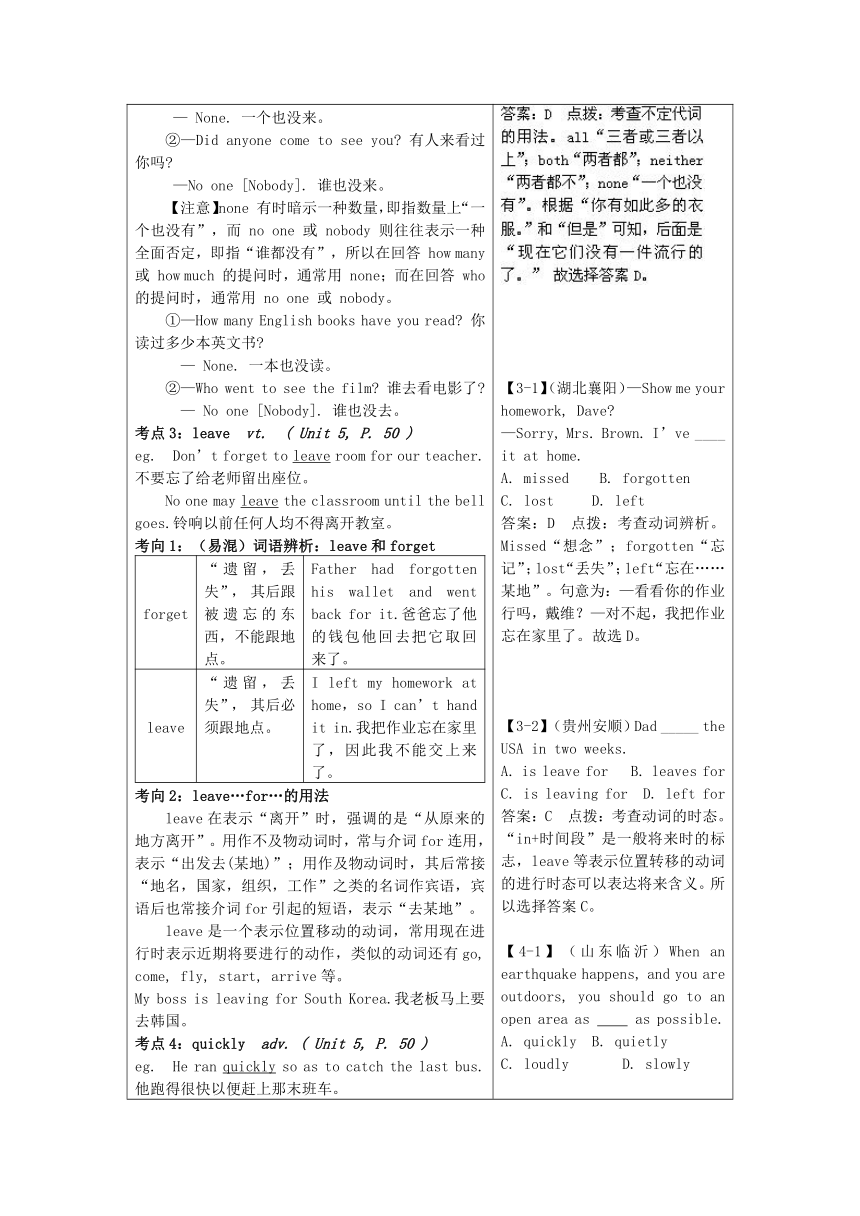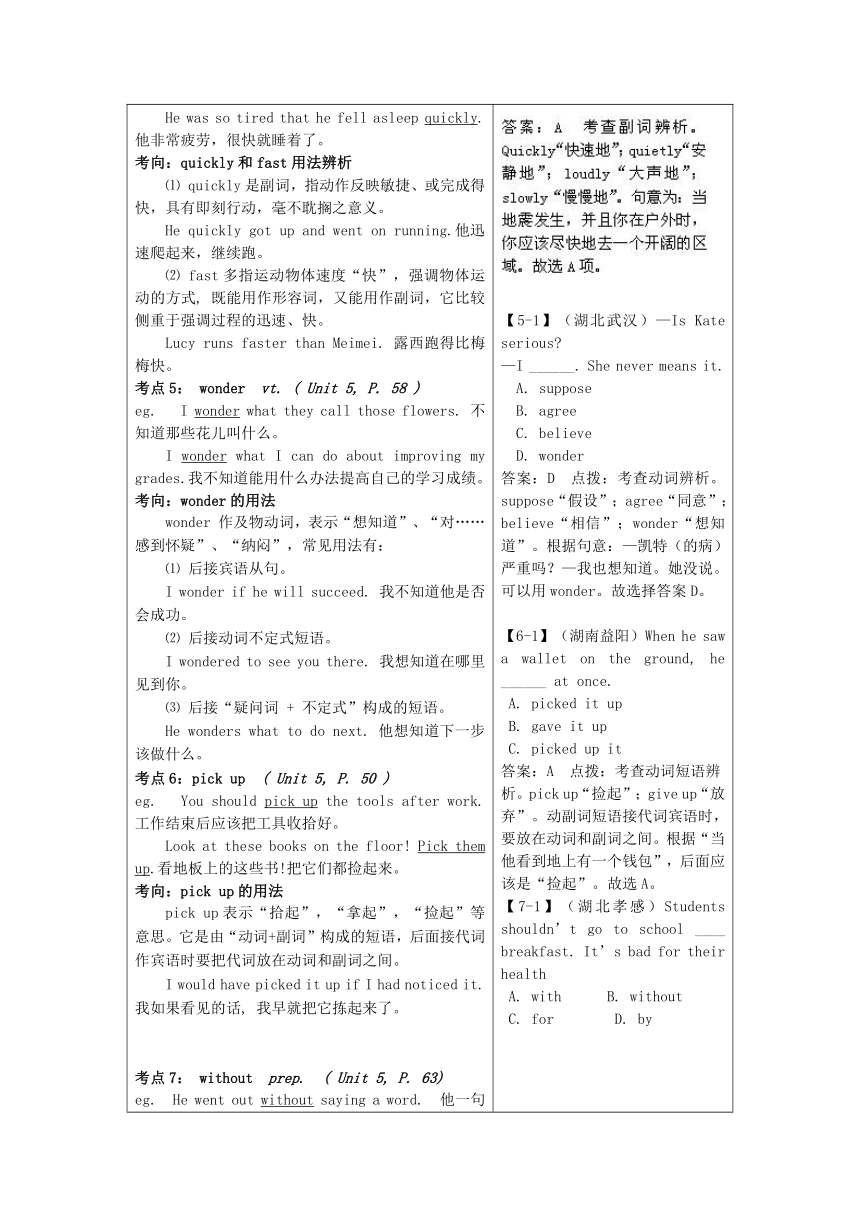牛津译林版英语七年级下教材教学考点精析(unit5--unit8)
文档属性
| 名称 | 牛津译林版英语七年级下教材教学考点精析(unit5--unit8) |  | |
| 格式 | zip | ||
| 文件大小 | 103.8KB | ||
| 资源类型 | 教案 | ||
| 版本资源 | 牛津译林版 | ||
| 科目 | 英语 | ||
| 更新时间 | 2016-07-23 23:05:55 | ||
图片预览



文档简介
牛津译林七年级下教材教学考点精析(unit5--unit8)
考点提炼
真题链接
考点1:stop doing sth. ( Unit 5, P. 57 )
eg. He found it difficult to stop smoking. 他觉得戒烟是件难事。
I’m warning you for the last time stop talking! 我最後一次警告你——不要再说话了。
考向:(易错)辨析:stop doing sth.和stop to do sth.
⑴ stop doing sth.是“停止正在做的事”,stop是及物动词,其后的动名词作宾语。
When the teacher came, the students stopped talking. 老师进来时,学生们停止了谈话。
⑵ stop to do sth.是“停止正在干的事,去干别的事”,stop是不及物动词,to do(sth.)是目的状语。
We stopped to have a rest. 我们停下来休息一会儿。
考点2:nobody pron. ( Unit 5, P. 58 )
eg. I’ve called but nobody answered. 我打过电话了,但是没有人接。
It is not a good idea. For one thing, nobody will help us.
那不是个好办法,首先没人会帮我们的忙。
考向:词语辨析:nobody, no one与none
⑴nobody = no one,两者均只能指人,不能指物;用作主语时,谓语动词一般用单数。
No one (Nobody) likes it. 没人喜欢它。
⑵ none 既可指人也可指物,其后通常接of短语;用作主语时,若指不可数名词,谓语只能用单数,若指可数名词,则谓语可用单数(较正式)也可用复数(用于非正式文体,但更符合惯用法)。
None of the food was left. 一点食物都没留下。
None of the books is (are) interesting. 没有一本书有趣。
⑶ none 往往暗示有一定的范围(这种范围通常就表现在其后的 of 短语上),而 no one 或 nobody 则不暗示这种范围。
①—Did any of your friends come to see you? 你的朋友当中有谁来看过你吗?
— None. 一个也没来。
②—Did anyone come to see you? 有人来看过你吗?
—No one [Nobody]. 谁也没来。
【注意】none 有时暗示一种数量,即指数量上“一个也没有”,而 no one 或 nobody 则往往表示一种全面否定,即指“谁都没有”,所以在回答 how many 或 how much 的提问时,通常用 none;而在回答 who 的提问时,通常用 no one 或 nobody。
①—How many English books have you read? 你读过多少本英文书?
— None. 一本也没读。
②—Who went to see the film? 谁去看电影了?
— No one [Nobody]. 谁也没去。
考点3:leave vt. ( Unit 5, P. 50 )
eg. Don’t forget to leave room for our teacher.不要忘了给老师留出座位。
No one may leave the classroom until the bell goes.铃响以前任何人均不得离开教室。
考向1:(易混)词语辨析:leave和forget
forget
“遗留,丢失”, 其后跟被遗忘的东西,不能跟地点。
Father had forgotten his wallet and went back for it.爸爸忘了他的钱包他回去把它取回来了。
leave
“遗留,丢失”, 其后必须跟地点。
I left my homework at home,so I can’t hand it in.我把作业忘在家里了,因此我不能交上来了。
考向2:leave…for…的用法
leave在表示“离开”时,强调的是“从原来的地方离开”。用作不及物动词时,常与介词for连用,表示“出发去(某地)”;用作及物动词时,其后常接“地名,国家,组织,工作”之类的名词作宾语,宾语后也常接介词for引起的短语,表示“去某地”。
leave是一个表示位置移动的动词,常用现在进行时表示近期将要进行的动作,类似的动词还有go, come, fly, start, arrive等。
My boss is leaving for South Korea.我老板马上要去韩国。
考点4:quickly adv. ( Unit 5, P. 50 )
eg. He ran quickly so as to catch the last bus.他跑得很快以便赶上那末班车。
He was so tired that he fell asleep quickly. 他非常疲劳,很快就睡着了。
考向:quickly和fast用法辨析
⑴ quickly是副词,指动作反映敏捷、或完成得快,具有即刻行动,毫不耽搁之意义。
He quickly got up and went on running.他迅速爬起来,继续跑。
⑵ fast多指运动物体速度“快”,强调物体运动的方式, 既能用作形容词,又能用作副词,它比较侧重于强调过程的迅速、快。
Lucy runs faster than Meimei. 露西跑得比梅梅快。
考点5: wonder vt. ( Unit 5, P. 58 )
eg. I wonder what they call those flowers. 不知道那些花儿叫什么。
I wonder what I can do about improving my grades.我不知道能用什么办法提高自己的学习成绩。
考向:wonder的用法
wonder 作及物动词,表示“想知道”、“对……感到怀疑”、“纳闷”,常见用法有:
⑴ 后接宾语从句。
I wonder if he will succeed. 我不知道他是否会成功。
⑵ 后接动词不定式短语。
I wondered to see you there. 我想知道在哪里见到你。
⑶ 后接“疑问词 + 不定式”构成的短语。
He wonders what to do next. 他想知道下一步该做什么。
考点6:pick up ( Unit 5, P. 50 )
eg. You should pick up the tools after work.工作结束后应该把工具收拾好。
Look at these books on the floor! Pick them up.看地板上的这些书!把它们都捡起来。
考向:pick up的用法
pick up表示“拾起”,“拿起”,“捡起”等意思。它是由“动词+副词”构成的短语,后面接代词作宾语时要把代词放在动词和副词之间。
I would have picked it up if I had noticed it. 我如果看见的话, 我早就把它拣起来了。
考点7: without prep. ( Unit 5, P. 63)
eg. He went out without saying a word. 他一句话没有说就出去了。
We can’t go any farther without a rest. 不休息我们就走不动了
考向:without的用法
⑴(表否定)没有,无,不需。
We got there without any trouble. 我们到了那儿,一路上没遇到任何麻烦。
⑵(用在no, not, never等否定副词之后,强调肯定)没有……不,没有……则不能……。
The old man cannot walk without a stick. 那位老先生离开手杖就走不了路。
⑶(与动词的-ing形式连用)不,无,没。
She entered the room without knocking. 她没敲门就进了房间。
考点8: not…any more ( Unit 5, P. 64 )
eg. I wish you wouldn’t smoke any more.我希望你别再抽烟了。
At one time I used to like her, but not any more.我一度很喜欢她,现在已不喜欢了。
考向:no longer, not…any longer, no more, not…any more辨析
⑴ no longer(= not…any longer),主要用来表示时间或距离的“不再”,意在对现在的情况和过去的情况加以比较,所以多用于现在时。它一般修饰延续性动词,表示某个动作或状态不再延续下去。
You are no longer a child. = You aren’t a child any longer. 你已不再是个孩子了。
⑵ no more(= not…any more),主要用来表示数量和程度,一般常修饰短暂性动词,指某动作不再重复发生,它所表达的是never again或“没有更多”的含义。
The baby no more cried. = The baby didn’t cry any more.这个小孩不再哭了。
考点9: as…as… ( Unit 5, P. 66 )
eg. Betty is as clever as her brother Tom.贝蒂和她哥哥汤姆一样聪明。
You can keep my book as long as you like. 我的书你要借多久都随你的便。
考向:as…as…的用法
⑴ as…as…表示“与……一样”时,常用as+形容词(副词)原级+as...结构。
She speaks English as well as her sister does.她的英语说得和她姐姐一样好。
⑵ 表示“不如……那样”时,常用not so(as)+形容词(副词) 原级+as...,在not后用副词so或as均可,但句末的as不能用so代替。
It is not as(so) warm today as yesterday.今天不如昨天暖和。
考点10: hurry (up) ( Unit 6, P. 68 )
eg. We must hurry up, or we’ll be late. 咱们快点吧,不然就迟到了。
She was in a hurry to see her child.她急切地想见到她的孩子。
考向:hurry及其短语的用法
用作动词
hurry“匆忙去……”,之后只需直接表示方向的副词或介词短语即可,习惯上不接 go, come, move 等表示运动方向的动词。He hurried home (to school). 他匆忙回家(去上学)。
hurry up“赶快”,有时可接“and+动词”来代替表示目的的不定式。Hurry up and get dressed. 赶快穿好衣服。
用作名词
in a hurry“匆忙,急切”,其中须有冠词。He was in a hurry to leave. 他急于要离开。
no hurry “不忙;不必着急”。
There is no hurry to make a decision.
没有必要匆忙作出决定。
考点11: alone adj. ( Unit 6, P. 70 )
eg. Do you ever take the subway alone late at night?
你有没有在深夜单独乘过地铁?
I look forward to being alone in the house.我盼望着能自己一人待在这所房子里。
考向:(易错)词语辨析:alone,lonely
lonely
“孤独的,寂寞的”,强调内心的寂寞和孤独,用作定语或表语。
I stay on so that he may not feel lonely. 我留下来以使他可能不会再感到孤独。
alone
“独自的”,侧重于单独存在,作形容词时用作表语或后置定语。
She works best of all when she is alone. 她独自一人时,她工作得最好。
考点12: excited adj. ( Unit 6, P. 76 )
eg. She is very excited about winning the first prize.赢得首奖,她激动不已。
I couldn’t get to sleep last night; I was too excited. 我昨晚无法入睡,我太兴奋了。
考向:(易混)词语辨析:excited和exciting
⑴ excited表示“兴奋的,激动的”,指人、物对……感到兴奋。
Are you excited about going to Beijing? 你要去北京了,感到兴奋吗?
⑵ exciting表示“令人兴奋的;使人激动的”,指人、事、物本身让人兴奋、激动。
He told us an exciting story yesterday. 他昨天给我们讲了一个使人激动的故事。
【注意】一般情况下,是人做主语,用v-ed形式;物做主语,用v-ing形式,其他类似的词有surprising /surprised;interesting/interested 等。
考点13: too…to… ( Unit 6, P. 78 )
eg. He walked too slowly to catch up with me. 他走得太慢而不能跟上我。
I am only too glad to accept your kind invitation. 我非常高兴地接受你的邀请。
考向:too…to…的用法
⑴ too… to…“太……以致不能……”,表示具有否定意义的结果。too后接形容词或副词表示否定的原因,后面的to十动词原形表示否定的内容。
I’m too tired to go any farther.我太累了,不能再向前走了。
⑵ too…to…以肯定的形式表达了否定的意义,以简单句的结构表达了复合句的内容,这个结构可转换为so…that…not…句型。
The woman is too old to get on the bus.
→The woman is so old that she can’t get on the bus.
⑶ too…to…结构也可以用反义的形容词转换为enough to结构。
The room is too small to hold so many people.
→The room isn’t big enough to hold so many people.
考点14:No problem. ( Unit 7, P. 85 )
eg. No problem, we will make it later in the month.没关系,这个月改天再说吧。
No problem, you can leave all that to us.没问题,您可以把这都交给我们。
考向:No problem在口语中用法
⑴ 用来回答感谢(主要用于美国英语中),意为“不用谢;别客气;没什么”。
—Thank you very much. 非常感谢你。
—No problem. 没什么。
⑵ 用来回答道歉(主要用于美国英语中),意为“没关系;没什么”。
—I’m sorry I’m late. 很抱歉,我来晚了。
—No problem. 没关系。
⑶ 用来表示同意或愉快地回答请求,意为“没问题;小事一桩”。
—Could you lend me your dictionary? 你能把字典借我用用吗?
—No problem. 没问题。
⑷ 用来表示有能力做某事,意为“没问题;不在话下”。
—Can you make a kite? 你会做风筝吗?
—No problem. 没问题。
考点15:take care of ( Unit 8, P. 95 )
eg. He’s old enough to take care of himself.他大了,能照顾自己了。
I’ll take care of your children while you are away.你不在时我会照顾你的孩子的。考向:动词短语辨析:look after,take care of
⑴ take care of与look after都能作“照顾、照料”解,可以互相替换。但look after没有“保管、保护”的意思。She stayed at home and took care of her mother yesterday.
=She stayed at home and looked after her mother yesterday.昨天她呆在家里照料她母亲了。
⑵ take good care of和look after…well意义相同,都是“好好照料、好好照顾”的意思。但要注意,take care of用的是good一词,而look after则用well。
【1-1】(宁夏)Suddenly the house began to shake. He stopped ______ music and rushed out.
A. to listen to
B. to listen
C. listening
D. listening to
【2-1】(黑龙江哈尔滨)______ was born being good at all things. You can do well in things through hard work. As an English learner, you can’t be excellent without enough practice.
A. Everybody
B. Somebody
C. Nobody
答案:C 点拨:考查不定代词的用法。采用推理判断法。由下两句“你可以通过努力学习,做好事情。作为一名英语学习者,没有足够的练习你不可能很优秀”可推知前句为“没有人一出生就擅长所有的事情”,故选C。
【2-2】(江苏扬州)— Wow! You’ve got so many clothes.
— But ______ of them are in fashion now.
A. all B. both
C. neither D. none
【3-1】(湖北襄阳)—Show me your homework, Dave?
—Sorry, Mrs. Brown. I’ve ____ it at home.
A. missed B. forgotten
C. lost D. left
答案:D 点拨:考查动词辨析。Missed“想念”;forgotten“忘记”;lost“丢失”;left“忘在……某地”。句意为:—看看你的作业行吗,戴维?—对不起,我把作业忘在家里了。故选D。
【3-2】(贵州安顺)Dad _____ the USA in two weeks.
A. is leave for B. leaves for
C. is leaving for D. left for
答案:C 点拨:考查动词的时态。“in+时间段”是一般将来时的标志,leave等表示位置转移的动词的进行时态可以表达将来含义。所以选择答案C。
【4-1】(山东临沂)When an earthquake happens, and you are outdoors, you should go to an open area as as possible.
A. quickly B. quietly
C. loudly D. slowly
【5-1】(湖北武汉)—Is Kate serious?
—I ______. She never means it.
A. suppose
B. agree
C. believe
D. wonder
答案:D 点拨:考查动词辨析。suppose“假设”;agree“同意”;believe“相信”;wonder“想知道”。根据句意:—凯特(的病)严重吗?—我也想知道。她没说。可以用wonder。故选择答案D。
【6-1】(湖南益阳)When he saw a wallet on the ground, he ______ at once.
A. picked it up
B. gave it up
C. picked up it
答案:A 点拨:考查动词短语辨析。pick up“捡起”;give up“放弃”。动副词短语接代词宾语时,要放在动词和副词之间。根据“当他看到地上有一个钱包”,后面应该是“捡起”。故选A。
【7-1】(湖北孝感)Students shouldn’t go to school ____ breakfast. It’s bad for their health
A. with B. without
C. for D. by
【8-1】(江苏无锡)
别再犯如此愚蠢的错误了,否则你只能另谋高就了。
Don’t , or you will have to find another job.
答案:make such silly mistakes /a silly mistake any more
【9-1】(甘肃白银)—English isn’t as _____ as Chinese.
—Maybe, perhaps it’s just because Chinese is your native language.
A. easy B. easily
C. easier D. easiest
答案:A 点拨:考查as…as…用法。采用排除法。as…as之间用形容词或副词的原级,首先排除C、D,在系动词be之后用形容词,又排除B。故选A。
【10-1】(福建福州)将下列句子译成英语。必须用上所给的提示词。
快点,否则你会迟到。(hurry, or)
_________________________
答案:Hurry up, or you’ll be late.
【10-2】(浙江丽水)_______, you guys! You don’t want to miss the train, do you?
A. Look up B. Give up
C. Hurry up D. Grow up
【11-1】(黑龙江绥化)Though he is _____ at home, he doesn’t feel _____for he has many things to do.
A. alone; lonely
B. lonely; alone
C. alone; alone
答案:A 点拨:考查形容词辨析。句意为:虽然他独自一人在家,但是他并不感到寂寞,因为他有很多事情要做。alone “单独的”,只作表语;lonely“孤独的”,表示主观上感觉。?第一空是作is的表语;第二空是作feel的表语,feel lonely感到孤独的,故选A。
【12-1】(四川遂宁)Everyone was when they heard the news.
A. exciting, exciting
B. excited, exciting
C. exciting, excited
【13-1】(湖北孝感)完成句子,根据个小题A句的意思完成B句,使句子的意思基本相同。每空限填一个单词。
A: T he box is so heavy that we can’t car ry it.
B: The box is ______ heavy for us ______ carry.
答案:too, to
【13-2】(湖北宜昌)我的汤太烫,没法喝。(hot)
My soup is ___________.
答案:too hot to drink / so hot that I can’t drink (it)
【14-1】(天津)—Will you carry the box for me, please?
? ?? ?—Sure, ______.
A.??no good
B. no problem? ?
?C. no idea? ?
D. no way
答案:B 点拨:考查情景交际。句意:——请你为我搬这个箱子,好吗?—当然,______。no good意为“很糟,没有用”;no problem意为“没问题”;no idea意为“不知道”;no way意为“决不,一点也不”;根据题意可知,“当然”之后用“没问题”最为贴切。故选B。
【15-1】(2013,广东广州) Thanks for your invitation, but I’m so sorry I can’t go. I need to ______ my baby at home.
A. take away
B. take off
C. take care of
D. take out of
考点提炼
真题链接
考点1:stop doing sth. ( Unit 5, P. 57 )
eg. He found it difficult to stop smoking. 他觉得戒烟是件难事。
I’m warning you for the last time stop talking! 我最後一次警告你——不要再说话了。
考向:(易错)辨析:stop doing sth.和stop to do sth.
⑴ stop doing sth.是“停止正在做的事”,stop是及物动词,其后的动名词作宾语。
When the teacher came, the students stopped talking. 老师进来时,学生们停止了谈话。
⑵ stop to do sth.是“停止正在干的事,去干别的事”,stop是不及物动词,to do(sth.)是目的状语。
We stopped to have a rest. 我们停下来休息一会儿。
考点2:nobody pron. ( Unit 5, P. 58 )
eg. I’ve called but nobody answered. 我打过电话了,但是没有人接。
It is not a good idea. For one thing, nobody will help us.
那不是个好办法,首先没人会帮我们的忙。
考向:词语辨析:nobody, no one与none
⑴nobody = no one,两者均只能指人,不能指物;用作主语时,谓语动词一般用单数。
No one (Nobody) likes it. 没人喜欢它。
⑵ none 既可指人也可指物,其后通常接of短语;用作主语时,若指不可数名词,谓语只能用单数,若指可数名词,则谓语可用单数(较正式)也可用复数(用于非正式文体,但更符合惯用法)。
None of the food was left. 一点食物都没留下。
None of the books is (are) interesting. 没有一本书有趣。
⑶ none 往往暗示有一定的范围(这种范围通常就表现在其后的 of 短语上),而 no one 或 nobody 则不暗示这种范围。
①—Did any of your friends come to see you? 你的朋友当中有谁来看过你吗?
— None. 一个也没来。
②—Did anyone come to see you? 有人来看过你吗?
—No one [Nobody]. 谁也没来。
【注意】none 有时暗示一种数量,即指数量上“一个也没有”,而 no one 或 nobody 则往往表示一种全面否定,即指“谁都没有”,所以在回答 how many 或 how much 的提问时,通常用 none;而在回答 who 的提问时,通常用 no one 或 nobody。
①—How many English books have you read? 你读过多少本英文书?
— None. 一本也没读。
②—Who went to see the film? 谁去看电影了?
— No one [Nobody]. 谁也没去。
考点3:leave vt. ( Unit 5, P. 50 )
eg. Don’t forget to leave room for our teacher.不要忘了给老师留出座位。
No one may leave the classroom until the bell goes.铃响以前任何人均不得离开教室。
考向1:(易混)词语辨析:leave和forget
forget
“遗留,丢失”, 其后跟被遗忘的东西,不能跟地点。
Father had forgotten his wallet and went back for it.爸爸忘了他的钱包他回去把它取回来了。
leave
“遗留,丢失”, 其后必须跟地点。
I left my homework at home,so I can’t hand it in.我把作业忘在家里了,因此我不能交上来了。
考向2:leave…for…的用法
leave在表示“离开”时,强调的是“从原来的地方离开”。用作不及物动词时,常与介词for连用,表示“出发去(某地)”;用作及物动词时,其后常接“地名,国家,组织,工作”之类的名词作宾语,宾语后也常接介词for引起的短语,表示“去某地”。
leave是一个表示位置移动的动词,常用现在进行时表示近期将要进行的动作,类似的动词还有go, come, fly, start, arrive等。
My boss is leaving for South Korea.我老板马上要去韩国。
考点4:quickly adv. ( Unit 5, P. 50 )
eg. He ran quickly so as to catch the last bus.他跑得很快以便赶上那末班车。
He was so tired that he fell asleep quickly. 他非常疲劳,很快就睡着了。
考向:quickly和fast用法辨析
⑴ quickly是副词,指动作反映敏捷、或完成得快,具有即刻行动,毫不耽搁之意义。
He quickly got up and went on running.他迅速爬起来,继续跑。
⑵ fast多指运动物体速度“快”,强调物体运动的方式, 既能用作形容词,又能用作副词,它比较侧重于强调过程的迅速、快。
Lucy runs faster than Meimei. 露西跑得比梅梅快。
考点5: wonder vt. ( Unit 5, P. 58 )
eg. I wonder what they call those flowers. 不知道那些花儿叫什么。
I wonder what I can do about improving my grades.我不知道能用什么办法提高自己的学习成绩。
考向:wonder的用法
wonder 作及物动词,表示“想知道”、“对……感到怀疑”、“纳闷”,常见用法有:
⑴ 后接宾语从句。
I wonder if he will succeed. 我不知道他是否会成功。
⑵ 后接动词不定式短语。
I wondered to see you there. 我想知道在哪里见到你。
⑶ 后接“疑问词 + 不定式”构成的短语。
He wonders what to do next. 他想知道下一步该做什么。
考点6:pick up ( Unit 5, P. 50 )
eg. You should pick up the tools after work.工作结束后应该把工具收拾好。
Look at these books on the floor! Pick them up.看地板上的这些书!把它们都捡起来。
考向:pick up的用法
pick up表示“拾起”,“拿起”,“捡起”等意思。它是由“动词+副词”构成的短语,后面接代词作宾语时要把代词放在动词和副词之间。
I would have picked it up if I had noticed it. 我如果看见的话, 我早就把它拣起来了。
考点7: without prep. ( Unit 5, P. 63)
eg. He went out without saying a word. 他一句话没有说就出去了。
We can’t go any farther without a rest. 不休息我们就走不动了
考向:without的用法
⑴(表否定)没有,无,不需。
We got there without any trouble. 我们到了那儿,一路上没遇到任何麻烦。
⑵(用在no, not, never等否定副词之后,强调肯定)没有……不,没有……则不能……。
The old man cannot walk without a stick. 那位老先生离开手杖就走不了路。
⑶(与动词的-ing形式连用)不,无,没。
She entered the room without knocking. 她没敲门就进了房间。
考点8: not…any more ( Unit 5, P. 64 )
eg. I wish you wouldn’t smoke any more.我希望你别再抽烟了。
At one time I used to like her, but not any more.我一度很喜欢她,现在已不喜欢了。
考向:no longer, not…any longer, no more, not…any more辨析
⑴ no longer(= not…any longer),主要用来表示时间或距离的“不再”,意在对现在的情况和过去的情况加以比较,所以多用于现在时。它一般修饰延续性动词,表示某个动作或状态不再延续下去。
You are no longer a child. = You aren’t a child any longer. 你已不再是个孩子了。
⑵ no more(= not…any more),主要用来表示数量和程度,一般常修饰短暂性动词,指某动作不再重复发生,它所表达的是never again或“没有更多”的含义。
The baby no more cried. = The baby didn’t cry any more.这个小孩不再哭了。
考点9: as…as… ( Unit 5, P. 66 )
eg. Betty is as clever as her brother Tom.贝蒂和她哥哥汤姆一样聪明。
You can keep my book as long as you like. 我的书你要借多久都随你的便。
考向:as…as…的用法
⑴ as…as…表示“与……一样”时,常用as+形容词(副词)原级+as...结构。
She speaks English as well as her sister does.她的英语说得和她姐姐一样好。
⑵ 表示“不如……那样”时,常用not so(as)+形容词(副词) 原级+as...,在not后用副词so或as均可,但句末的as不能用so代替。
It is not as(so) warm today as yesterday.今天不如昨天暖和。
考点10: hurry (up) ( Unit 6, P. 68 )
eg. We must hurry up, or we’ll be late. 咱们快点吧,不然就迟到了。
She was in a hurry to see her child.她急切地想见到她的孩子。
考向:hurry及其短语的用法
用作动词
hurry“匆忙去……”,之后只需直接表示方向的副词或介词短语即可,习惯上不接 go, come, move 等表示运动方向的动词。He hurried home (to school). 他匆忙回家(去上学)。
hurry up“赶快”,有时可接“and+动词”来代替表示目的的不定式。Hurry up and get dressed. 赶快穿好衣服。
用作名词
in a hurry“匆忙,急切”,其中须有冠词。He was in a hurry to leave. 他急于要离开。
no hurry “不忙;不必着急”。
There is no hurry to make a decision.
没有必要匆忙作出决定。
考点11: alone adj. ( Unit 6, P. 70 )
eg. Do you ever take the subway alone late at night?
你有没有在深夜单独乘过地铁?
I look forward to being alone in the house.我盼望着能自己一人待在这所房子里。
考向:(易错)词语辨析:alone,lonely
lonely
“孤独的,寂寞的”,强调内心的寂寞和孤独,用作定语或表语。
I stay on so that he may not feel lonely. 我留下来以使他可能不会再感到孤独。
alone
“独自的”,侧重于单独存在,作形容词时用作表语或后置定语。
She works best of all when she is alone. 她独自一人时,她工作得最好。
考点12: excited adj. ( Unit 6, P. 76 )
eg. She is very excited about winning the first prize.赢得首奖,她激动不已。
I couldn’t get to sleep last night; I was too excited. 我昨晚无法入睡,我太兴奋了。
考向:(易混)词语辨析:excited和exciting
⑴ excited表示“兴奋的,激动的”,指人、物对……感到兴奋。
Are you excited about going to Beijing? 你要去北京了,感到兴奋吗?
⑵ exciting表示“令人兴奋的;使人激动的”,指人、事、物本身让人兴奋、激动。
He told us an exciting story yesterday. 他昨天给我们讲了一个使人激动的故事。
【注意】一般情况下,是人做主语,用v-ed形式;物做主语,用v-ing形式,其他类似的词有surprising /surprised;interesting/interested 等。
考点13: too…to… ( Unit 6, P. 78 )
eg. He walked too slowly to catch up with me. 他走得太慢而不能跟上我。
I am only too glad to accept your kind invitation. 我非常高兴地接受你的邀请。
考向:too…to…的用法
⑴ too… to…“太……以致不能……”,表示具有否定意义的结果。too后接形容词或副词表示否定的原因,后面的to十动词原形表示否定的内容。
I’m too tired to go any farther.我太累了,不能再向前走了。
⑵ too…to…以肯定的形式表达了否定的意义,以简单句的结构表达了复合句的内容,这个结构可转换为so…that…not…句型。
The woman is too old to get on the bus.
→The woman is so old that she can’t get on the bus.
⑶ too…to…结构也可以用反义的形容词转换为enough to结构。
The room is too small to hold so many people.
→The room isn’t big enough to hold so many people.
考点14:No problem. ( Unit 7, P. 85 )
eg. No problem, we will make it later in the month.没关系,这个月改天再说吧。
No problem, you can leave all that to us.没问题,您可以把这都交给我们。
考向:No problem在口语中用法
⑴ 用来回答感谢(主要用于美国英语中),意为“不用谢;别客气;没什么”。
—Thank you very much. 非常感谢你。
—No problem. 没什么。
⑵ 用来回答道歉(主要用于美国英语中),意为“没关系;没什么”。
—I’m sorry I’m late. 很抱歉,我来晚了。
—No problem. 没关系。
⑶ 用来表示同意或愉快地回答请求,意为“没问题;小事一桩”。
—Could you lend me your dictionary? 你能把字典借我用用吗?
—No problem. 没问题。
⑷ 用来表示有能力做某事,意为“没问题;不在话下”。
—Can you make a kite? 你会做风筝吗?
—No problem. 没问题。
考点15:take care of ( Unit 8, P. 95 )
eg. He’s old enough to take care of himself.他大了,能照顾自己了。
I’ll take care of your children while you are away.你不在时我会照顾你的孩子的。考向:动词短语辨析:look after,take care of
⑴ take care of与look after都能作“照顾、照料”解,可以互相替换。但look after没有“保管、保护”的意思。She stayed at home and took care of her mother yesterday.
=She stayed at home and looked after her mother yesterday.昨天她呆在家里照料她母亲了。
⑵ take good care of和look after…well意义相同,都是“好好照料、好好照顾”的意思。但要注意,take care of用的是good一词,而look after则用well。
【1-1】(宁夏)Suddenly the house began to shake. He stopped ______ music and rushed out.
A. to listen to
B. to listen
C. listening
D. listening to
【2-1】(黑龙江哈尔滨)______ was born being good at all things. You can do well in things through hard work. As an English learner, you can’t be excellent without enough practice.
A. Everybody
B. Somebody
C. Nobody
答案:C 点拨:考查不定代词的用法。采用推理判断法。由下两句“你可以通过努力学习,做好事情。作为一名英语学习者,没有足够的练习你不可能很优秀”可推知前句为“没有人一出生就擅长所有的事情”,故选C。
【2-2】(江苏扬州)— Wow! You’ve got so many clothes.
— But ______ of them are in fashion now.
A. all B. both
C. neither D. none
【3-1】(湖北襄阳)—Show me your homework, Dave?
—Sorry, Mrs. Brown. I’ve ____ it at home.
A. missed B. forgotten
C. lost D. left
答案:D 点拨:考查动词辨析。Missed“想念”;forgotten“忘记”;lost“丢失”;left“忘在……某地”。句意为:—看看你的作业行吗,戴维?—对不起,我把作业忘在家里了。故选D。
【3-2】(贵州安顺)Dad _____ the USA in two weeks.
A. is leave for B. leaves for
C. is leaving for D. left for
答案:C 点拨:考查动词的时态。“in+时间段”是一般将来时的标志,leave等表示位置转移的动词的进行时态可以表达将来含义。所以选择答案C。
【4-1】(山东临沂)When an earthquake happens, and you are outdoors, you should go to an open area as as possible.
A. quickly B. quietly
C. loudly D. slowly
【5-1】(湖北武汉)—Is Kate serious?
—I ______. She never means it.
A. suppose
B. agree
C. believe
D. wonder
答案:D 点拨:考查动词辨析。suppose“假设”;agree“同意”;believe“相信”;wonder“想知道”。根据句意:—凯特(的病)严重吗?—我也想知道。她没说。可以用wonder。故选择答案D。
【6-1】(湖南益阳)When he saw a wallet on the ground, he ______ at once.
A. picked it up
B. gave it up
C. picked up it
答案:A 点拨:考查动词短语辨析。pick up“捡起”;give up“放弃”。动副词短语接代词宾语时,要放在动词和副词之间。根据“当他看到地上有一个钱包”,后面应该是“捡起”。故选A。
【7-1】(湖北孝感)Students shouldn’t go to school ____ breakfast. It’s bad for their health
A. with B. without
C. for D. by
【8-1】(江苏无锡)
别再犯如此愚蠢的错误了,否则你只能另谋高就了。
Don’t , or you will have to find another job.
答案:make such silly mistakes /a silly mistake any more
【9-1】(甘肃白银)—English isn’t as _____ as Chinese.
—Maybe, perhaps it’s just because Chinese is your native language.
A. easy B. easily
C. easier D. easiest
答案:A 点拨:考查as…as…用法。采用排除法。as…as之间用形容词或副词的原级,首先排除C、D,在系动词be之后用形容词,又排除B。故选A。
【10-1】(福建福州)将下列句子译成英语。必须用上所给的提示词。
快点,否则你会迟到。(hurry, or)
_________________________
答案:Hurry up, or you’ll be late.
【10-2】(浙江丽水)_______, you guys! You don’t want to miss the train, do you?
A. Look up B. Give up
C. Hurry up D. Grow up
【11-1】(黑龙江绥化)Though he is _____ at home, he doesn’t feel _____for he has many things to do.
A. alone; lonely
B. lonely; alone
C. alone; alone
答案:A 点拨:考查形容词辨析。句意为:虽然他独自一人在家,但是他并不感到寂寞,因为他有很多事情要做。alone “单独的”,只作表语;lonely“孤独的”,表示主观上感觉。?第一空是作is的表语;第二空是作feel的表语,feel lonely感到孤独的,故选A。
【12-1】(四川遂宁)Everyone was when they heard the news.
A. exciting, exciting
B. excited, exciting
C. exciting, excited
【13-1】(湖北孝感)完成句子,根据个小题A句的意思完成B句,使句子的意思基本相同。每空限填一个单词。
A: T he box is so heavy that we can’t car ry it.
B: The box is ______ heavy for us ______ carry.
答案:too, to
【13-2】(湖北宜昌)我的汤太烫,没法喝。(hot)
My soup is ___________.
答案:too hot to drink / so hot that I can’t drink (it)
【14-1】(天津)—Will you carry the box for me, please?
? ?? ?—Sure, ______.
A.??no good
B. no problem? ?
?C. no idea? ?
D. no way
答案:B 点拨:考查情景交际。句意:——请你为我搬这个箱子,好吗?—当然,______。no good意为“很糟,没有用”;no problem意为“没问题”;no idea意为“不知道”;no way意为“决不,一点也不”;根据题意可知,“当然”之后用“没问题”最为贴切。故选B。
【15-1】(2013,广东广州) Thanks for your invitation, but I’m so sorry I can’t go. I need to ______ my baby at home.
A. take away
B. take off
C. take care of
D. take out of
